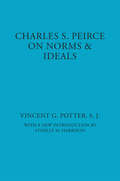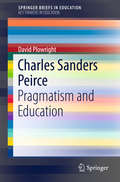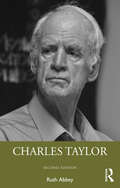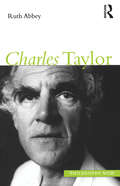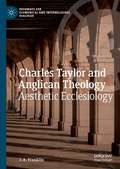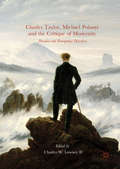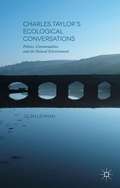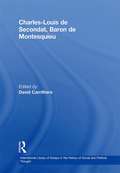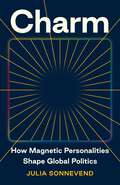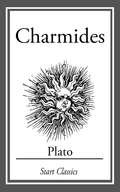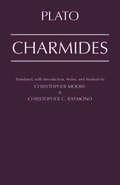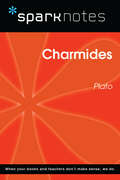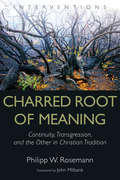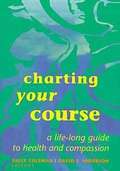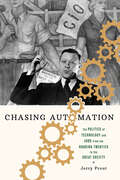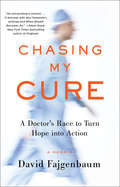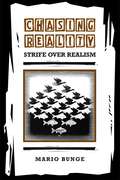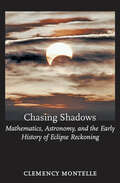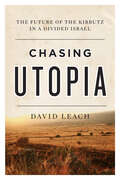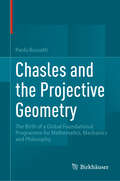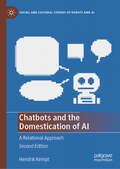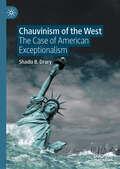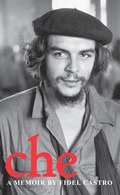- Table View
- List View
Charles S. Peirce: On Norms and Ideals (American Philosophy #No. 6)
by Vincent G. PotterIn recent years, Charles Sanders Peirce has emerged, in the eyes of philosophers both in America and abroad, as one of America’s major philosophical thinkers. His work has forced us back to philosophical reflection about those basic issues that inevitably confront us as human beings, especially in an age of science. Peirce’s concern for experience, for what is actually encountered, means that his philosophy, even in its most technical aspects, forms a reflective commentary on actual life and on the world in which it is lived. In Charles S. Peirce: On Norms and Ideals, Potter argues that Peirce’s doctrine of the normative sciences is essential to his pragmatism. No part of Peirce’s philosophy is bolder than his attempt to establish esthetics, ethics, and logic as the three normative sciences and to argue for the priority of esthetics among the trio. Logic, Potter cites, is normative because it governs thought and aims at truth; ethics is normative because it analyzes the ends to which thought should be directed; esthetics is normative and fundamental because it considers what it means to be an end of something good in itself. This study shows that pierce took seriously the trinity of normative sciences and demonstrates that these categories apply both to the conduct of man and to the workings of the cosmos. Professor Potter combines sympathetic and informed exposition with straightforward criticism and he deals in a sensible manner with the gaps and inconsistencies in Peirce’s thought. His study shows that Peirce was above all a cosmological and ontological thinker, one who combined science both as a method and as result with a conception of reasonable actions to form a comprehensive theory of reality. Peirce’s pragmatism, although it has to do with "action and the achievement of results, is not a glorification of action but rather a theory of the dynamic nature of things in which the "ideal" dimension of reality – laws, nature of things, tendencies, and ends – has genuine power for directing the cosmic order, including man, toward reasonable goals.
Charles Sanders Peirce: Pragmatism and Education (SpringerBriefs in Education)
by David PlowrightThis book introduces a number of selected ideas from the work of Charles Sanders Peirce, the founder of pragmatism. Peirce, pronounced 'purse', was born in America in 1839 and died in 1914. He published little in his own lifetime and he continually struggled to become recognised as a respected author with ideas that were highly creative, original and unique. The book begins with an examination of Peirce's life history. This is followed by an explanation of pragmatism, which states that an understanding of a concept can only be fully grasped by knowing what its practical effects are. The author then explains a number of Peirce's ideas that are based on his pragmatic maxim: · scientific inquiry as a method of investigation and its relevance to everyday thinking · inferential thinking based on abduction, deduction and induction and its use in educational research · semiotics, the study of signs and its relevance to the development of conceptual understanding · his profound and insightful ontological categories of Firstness, Secondness and Thirdness and their application to developing an understanding of the world around us This introductory text is written in a clear and accessible style. Numerous examples are used throughout the book to illustrate Peirce's complex and sophisticated ideas and to show how his thinking can be applied to education.
Charles Taylor
by Ruth AbbeyCharles Taylor is one of the most influential and prolific philosophers in the English-speaking world. The breadth of his writings is unique, ranging from reflections on artificial intelligence to analyses of contemporary multicultural societies and the role of religion in modern western societies. In this thought-provoking introduction to Taylor's work, Ruth Abbey outlines his ideas in a coherent and accessible way without unduly reducing their richness and depth. Taylor's reflections on the topics of epistemology, language, moral theory, selfhood, political theory, and religion form the core six chapters within the book. Retaining the thematic approach of the first edition, this second edition has been thoroughly revised, rewritten, and restructured. An ideal companion to Taylor's ideas and arguments, Charles Taylor is essential reading for students of philosophy, religion, and political theory, and will be welcomed by the non-specialist looking for an authoritative guide to Taylor's large and challenging body of work.
Charles Taylor (Philosophy Now)
by Ruth AbbeyCharles Taylor is one of the most influential and prolific philosophers in the English-speaking world today. The breadth of his writings is unique, ranging from reflections on artificial intelligence to analyses of contemporary multicultural societies. This thought-provoking introduction to Taylor's work outlines his ideas in a coherent and accessible way without reducing their richness and depth. His contribution to many of the enduring debates within Western philosophy is examined and the arguments of his critics assessed. Taylor's reflections on the topics of moral theory, selfhood, political theory and epistemology form the core chapters within the book. Ruth Abbey engages with the secondary literature on Taylor's work and suggests that some criticisms by contemporaries have been based on misinterpretations and suggests ways in which a better understanding of Taylor's work leads to different criticisms of it. The book serves as an ideal companion to Taylor's ideas for students of philosophy and political theory, and will be welcomed by the non-specialist looking for an authoritative guide to Taylor's large and challenging body of work.
Charles Taylor and Anglican Theology: Aesthetic Ecclesiology (Pathways for Ecumenical and Interreligious Dialogue)
by J. A. FranklinThis book considers the work of Charles Taylor from a theological perspective, specifically relating to the topic of ecclesiology. It argues that Taylor and related thinkers such as John Milbank and Rowan Williams point towards an “Aesthetic Ecclesiology,” an ecclesiology that values highly and utilizes the aesthetic in its self-understanding and practice. Jamie Franklin argues that Taylor’s work provides an account of the breakdown in Modernity of the conceptual relationship of the immanent and the transcendent, and that the work of John Milbank and radical orthodoxy give a complementary account of the secular from a more metaphysical angle. Franklin also incorporates the work of Rowan Williams, which provides us a way of thinking about the Church that is rooted in a material and historical legacy. The central argument is that the reconnection of the transcendent and the immanent coheres with an understanding of the Church that incorporates the material reality of the sacraments, the importance of artistic beauty and craftsmanship, and the Church’s status as historical, global, and eschatological. Secondly, the aesthetic provides the Church with a powerful apologetic: beauty cannot be reduced to the presuppositions of secular materialism, and so must be accounted for by recourse to transcendent categories.
Charles Taylor, Michael Polanyi and the Critique of Modernity: Pluralist and Emergentist Directions
by Charles W. Lowney IIThis book provides a timely, compelling, multidisciplinary critique of the largely tacit set of assumptions funding Modernity in the West. A partnership between Michael Polanyi and Charles Taylor's thought promises to cast the errors of the past in a new light, to graciously show how these errors can be amended, and to provide a specific cartography of how we can responsibly and meaningfully explore new possibilities for ethics, political society, and religion in a post-modern modernity.
Charles Taylor’s Ecological Conversations: Politics, Commonalities And The Natural Environment
by Glen LehmanThe author uses the work of the eminent Canadian philosopher, Charles Taylor, to develop a critique of those political perspectives that are based on instrumental ways to reason about the world, claiming that such perspectives invariably sever the connections between the social and natural worlds.
Charles-Louis de Secondat, Baron de Montesquieu (International Library Of Essays In The History Of Social And Political Thought Ser.)
by David CarrithersThe French philosophe Charles-Louis de Secondat, Baron de Montesquieu (1689-1755) was a political and social thinker of enormous depth, range, originality, and influence. The essays by eminent scholars reprinted in this volume explore significant aspects of his contributions to political, constitutional, and religious thought during the epoch of the French Enlightenment. Topics highlighted include his Persian Letters (1721), his history of Rome (1734), and the views he expressed in The Spirit of Laws (1748) on natural law, forms of government, English constitutionalism, religion, commerce, international relations, and the philosophy of history. Supplemented by a detailed introduction that contextualizes the papers selected for this volume, as well as an extensive bibliography, this work serves as an authoritative reference to the best scholarship on Montesquieu's political thought. The volume is edited and introduced by David W. Carrithers, Adolph Ochs Professor of Government at the University of Tennessee at Chattanooga and author of numerous publications on Montesquieu.
Charm: How Magnetic Personalities Shape Global Politics
by Julia SonnevendThe utilization—and weaponization—of charm in contemporary global politicsPolitics is a site of performance, and contemporary politicians often perform the role of a regular person—perhaps someone we would like to have a beer with. They win elections not because of the elevated rhetorical performances we often associate with charisma (&“ask not what your country can do for you&”), but because of something more ordinary and relatable. The everyday magic spell that politicians cast using mass and social media is what sociologist Julia Sonnevend calls &“charm.&” In this engaging and enlightening book, Sonnevend explores charm (and the related &“charm offensive&”) as a keyword of contemporary global politics. Successful political leaders deploy this form of personal magnetism—which relies on proximity to political tribes and manifests across a variety of media platforms—to appear authentic and accessible in their quest for power.Sonnevend examines the mediated self-representations of a set of liberal, illiberal, and authoritarian political leaders, past and present: New Zealand&’s Jacinda Ardern, Hungary&’s Viktor Orbán, Iran&’s Mohammad Javad Zarif, North Korea&’s Kim Jong-un, and Germany&’s Angela Merkel. She considers how charm (or the lack of it) is wielded as a political tool, and the ways charm is weaponized to shape the international image of a country, potentially influencing decisions about military aid, trade, and even tourism. Sonnevend argues that charm will shape the future of democracy worldwide, as political values will be increasingly embodied by mediated personalities. These figures will rise and fall, often fading into irrelevance; but if we do not understand charm&’s political power, we cannot grasp today&’s fragile political moment.
Charmides
by PlatoThe Charmides is a dialogue of Plato, in which Socrates engages a handsome and popular boy in a conversation about the meaning of sophrosyne, a Greek word usually translated into English as "temperance", "self-control", or "restraint". As is typical with Platonic early dialogues, the two never arrive at a completely satisfactory definition, but the discussion nevertheless raises many important points.
Charmides
by Plato"Moore and Raymond's Charmides is very impressive. The translation is excellent, and the Introduction and notes guide the reader into thorny problems in a way that renders them understandable: e.g., how to translate sôphrosunê, why we should care about self-knowledge, or how to seek to clarify important ethico-political concepts. The result provides almost all of what an instructor will need to introduce this unjustly neglected dialogue into a syllabus. Moreover, the volume is a wide-ranging resource for specialists. Students of the 'Socratic Dialogues' will profit greatly from this admirable contribution." —David J. Murphy is co-editor of Antiphontis et Andocidis Orationes (Oxford) and author of "The Basis of the Text of Plato's Charmides" (Mnemosyne) and many other contributions on the Charmides. He lives in New York City.
Charmides (SparkNotes Philosophy Guide)
by SparkNotesCharmides (SparkNotes Philosophy Guide) Making the reading experience fun! SparkNotes Philosophy Guides are one-stop guides to the great works of philosophy–masterpieces that stand at the foundations of Western thought. Inside each Philosophy Guide you&’ll find insightful overviews of great philosophical works of the Western world.
Charred Root of Meaning: Continuity, Transgression, and the Other in Christian Tradition (Interventions (INT))
by Philipp W. RosemannEcologists tell us that periodic wildfires, though devastating, are necessary to the rhythm of nature. The death of the old allows something new to grow, sometimes straight back from the charred roots. Christian tradition functions much the same way, says Philipp Rosemann. In this book he examines how transgression and destruction are crucial in the foundation and preservation of tradition.Theories of tradition have emphasized the handing-down of identity rather than continuity through difference. Rosemann shows that divine revelation occurs as an irruption that challenges the existing order. The preservation of tradition, he argues, requires that this challenge be periodically repeated. Offering a historical, theological, and philosophical approach to Christian tradition, Charred Root of Meaning shows how transgression and reformation keep the Christian faith alive.
Charred Root of Meaning: Continuity, Transgression, and the Other in Christian Tradition (Interventions)
by Philipp W. RosemannEcologists tell us that periodic wildfires, though devastating, are necessary to the rhythm of nature. The death of the old allows something new to grow, sometimes straight back from the charred roots. Christian tradition functions much the same way, says Philipp Rosemann. In this book he examines how transgression and destruction are crucial in the foundation and preservation of tradition.Theories of tradition have emphasized the handing-down of identity rather than continuity through difference. Rosemann shows that divine revelation occurs as an irruption that challenges the existing order. The preservation of tradition, he argues, requires that this challenge be periodically repeated. Offering a historical, theological, and philosophical approach to Christian tradition, Charred Root of Meaning shows how transgression and reformation keep the Christian faith alive.
Charting your Course: A Life-Long Guide to Health and Compassion
by David Anderson Sally ColemanAlthough this is a textbook written for young people, its applications are much broader: the person thinking about career change; the young parent; the new grandparent; the spiritual leader/planner. "Charting Your Course is based on Seven Health Principles. Each principle identifies a vital area of life and presents a healthy orientation toward that area. The seven areas are attitude, personal values, holistic health, relationships, community, the natural world, and service to others."
Chasing Automation: The Politics of Technology and Jobs from the Roaring Twenties to the Great Society
by Jerry ProutChasing Automation tells the story of how a group of reform-minded politicians during the heyday of America's industrial prowess (1921–1966) sought to plan for the technological future. Beginning with Warren G. Harding and the Conference he convened in 1921, Jerry Prout looks at how the US political system confronted the unemployment caused by automation. Both liberals and conservatives spoke to the crucial role of technology in economic growth and the need to find work for the unemployed, and Prout shows how their disputes turned on the means of achieving these shared goals and the barriers that stood in the way. This political history highlights the trajectories of two premier scientists of the period, Norbert Wiener and Vannevar Bush, who walked very different paths. Wiener began quietly developing his language of cybernetics in the 1920s though its effect would not be realized until the late 1940s. The more pragmatic Bush was tapped by FDR to organize the scientific community and his ultimate success—the Manhattan Project—is emblematic of the technological hubris of the era.Chasing Automation shows that as American industrial productivity dramatically increased, the political system was at the mercy of the steady advance of job replacing technology. It was the sheer unpredictability of technological progress that ultimately posed the most formidable challenge. Reformers did not succeed in creating a federal planning agency, but they did create a enduring safety net of laws that workers continue to benefit from today as we face a new wave of automation and artificial intelligence.
Chasing My Cure: A Doctor's Race to Turn Hope into Action; A Memoir
by David FajgenbaumThe powerful memoir of a young doctor and former college athlete diagnosed with a rare disease who spearheaded the search for a cure—and became a champion for a new approach to medical research.“An extraordinary memoir . . . It belongs with Atul Gawande’s writings and When Breath Becomes Air.”—Adam Grant, New York Times bestselling author of OriginalsDavid Fajgenbaum was a former Georgetown quarterback nicknamed the Beast in medical school, where he was also known for his unmatched mental stamina. But things changed dramatically when he began suffering from inexplicable fatigue. In a matter of weeks, his organs were failing and he was read his last rites. Doctors were baffled by his condition, which they had yet to even diagnose. Floating in and out of consciousness, Fajgenbaum prayed for the equivalent of a game day overtime: a second chance. Miraculously, Fajgenbaum survived—only to endure repeated near-death relapses from what would eventually be identified as a form of Castleman disease, an extremely deadly and rare condition that acts like a cross between cancer and an autoimmune disorder. When he relapsed while on the only drug in development and realized that the medical community was unlikely to make progress in time to save his life, Fajgenbaum turned his desperate hope for a cure into concrete action: Between hospitalizations he studied his own charts and tested his own blood samples, looking for clues that could unlock a new treatment. With the help of family, friends, and mentors, he also reached out to other Castleman disease patients and physicians, and eventually came up with an ambitious plan to crowdsource the most promising research questions and recruit world-class researchers to tackle them. Instead of waiting for the scientific stars to align, he would attempt to align them himself. More than five years later and now married to his college sweetheart, Fajgenbaum has seen his hard work pay off: A treatment that he identified has induced a tentative remission and his novel approach to collaborative scientific inquiry has become a blueprint for advancing rare disease research. His incredible story demonstrates the potency of hope, and what can happen when the forces of determination, love, family, faith, and serendipity collide.“A page-turning chronicle of living, nearly dying, and discovering what it really means to be invincible in hope.”—Angela Duckworth, #1 New York Times bestselling author of Grit
Chasing Reality
by Mario BungeChasing Reality deals with the controversies over the reality of the external world. Distinguished philosopher Mario Bunge offers an extended defence of realism, a critique of various forms of contemporary anti-realism, and a sketch of his own version of realism, namely hylorealism. Bunge examines the main varieties of antirealism - Berkeley's, Hume's, and Kant's; positivism, phenomenology, and constructivism - and argues that all of these in fact hinder scientific research. Bunge's realist contention is that genuine explanations in the sciences appeal to causal laws and mechanisms that are not directly observable, rather than simply to empirical generalisations. Genuine science, in his view, is objective even when it deals with subjective phenomena such as feelings of fear. This work defends a realist view of universals, kinds, possibilities, and dispositions, while rejecting contemporary accounts of these that are couched in terms of modal logic and 'possible worlds. '
Chasing Shadows: Mathematics, Astronomy, and the Early History of Eclipse Reckoning (Johns Hopkins Studies in the History of Mathematics)
by Clemency MontelleLunar and solar eclipses have always fascinated human beings. Digging deep into history, Clemency Montelle examines the ways in which theoretical understanding of eclipses originated and how ancient and medieval cultures shared, developed, and preserved their knowledge of these awe-inspiring events.Eclipses were the celestial phenomena most challenging to understand in the ancient world. Montelle draws on original research—much of it derived from reading primary source material written in Akkadian and Sanskrit, as well as ancient Greek, Latin, and Arabic—to explore how observers in Babylon, the Islamic Near East, Greece, and India developed new astronomical and mathematical techniques to predict and describe the features of eclipses. She identifies the profound scientific discoveries of these four cultures and discusses how the societies exchanged information about eclipses. In constructing this history, Montelle establishes a clear pattern of the transmission of scientific ideas from one culture to another in the ancient and medieval world. Chasing Shadows is an invitingly written and highly informative exploration of the early history of astronomy.
Chasing Utopia: The Future of the Kibbutz in a Divided Israel
by David LeachA fascinating, non-partisan exploration of an incendiary regionSay the word “Israel” today and it sparks images of walls and rockets and a bloody conflict without end. Yet for decades, the symbol of the Jewish State was the noble pioneer draining the swamps and making the deserts bloom: the legendary kibbutznik. So what ever happened to the pioneers’ dream of founding a socialist utopia in the land called Palestine?Chasing Utopia: The Future of the Kibbutz in a Divided Israel draws readers into the quest for answers to the defining political conflict of our era. Acclaimed author David Leach revisits his raucous memories of life as a kibbutz volunteer and returns to meet a new generation of Jewish and Arab citizens struggling to forge a better future together. Crisscrossing the nation, Leach chronicles the controversial decline of Israel’s kibbutz movement and witnesses a renaissance of the original vision for a peaceable utopia in unexpected corners of the Promised Land. Chasing Utopia is an entertaining and enlightening portrait of a divided nation where hope persists against the odds.
Chasles and the Projective Geometry: The Birth of a Global Foundational Programme for Mathematics, Mechanics and Philosophy
by Paolo BussottiThis monograph meticulously examines the contributions of French mathematician Michel Chasles to 19th-century geometry. Through an in-depth analysis of Chasles' extensive body of work, the author examines six pivotal arguments which collectively reshape the foundations of geometry. Chasles introduces a novel form of polarity, termed "parabolic," to the graphic context, so expressing the metric properties by means of this specific polarity—a foundational argument. Beyond the celebrated "Chasles theorem," he extends his analysis to the movement of a rigid body, employing concepts derived from projective geometry. This approach is consistently applied across diverse domains. Chasles employs the same methodology to analyze systems of forces. The fourth argument examined by the author concerns the principle of virtual velocities, which can also be addressed through a geometric analysis. In the fifth chapter, Chasles' philosophy of duality is explained. It is grounded on theduality principles of projective geometry. Finally, the author presents Chasles’ synthetic solution for the intricate problem of ellipsoid attraction—the sixth and concluding chapter. Throughout these explorations, Chasles engages in a dynamic scientific dialogue with leading physicists and mathematicians of his era, revealing diverse perspectives and nuances inherent in these discussions.Tailored for historians specializing in mathematics and geometry, this monograph also beckons philosophers of mathematics and science, offering profound insights into the philosophical, epistemological, and methodological dimensions of Chasles' groundbreaking contributions. Providing a comprehensive understanding of Chasles' distinctive perspective on 19th-century geometry, this work stands as a valuable resource for scholars and enthusiasts alike.
Chatbots and the Domestication of AI: A Relational Approach (Social and Cultural Studies of Robots and AI)
by Hendrik KemptWith the publication of chatGPT in December 2022, a new era of artificial dialogue systems and chatbots has emerged. Many established thinkers and figures have published their stance on the development of this technology, not rarely combined with stark language about its transformative potential and potential risks. New terminologies have found entrance to public and philosophical discourse, new regulatory frameworks have been introduced, from small to large scale, and an entire economy has shifted: many apps have sprung into existence using chatGPT and other LLMs as a basis for their services, large corporations take the risks of releasing unfinished language models to undercut the competition. In the meantime, many more stakeholders have entered the economic, regulatory, and social discourses on how to deal with this emerging technology. Taking the latest developments in the field into consideration this completely revised and updated second edition now includes new chapters on the tech-ethics of Large Language Models and LLMs as relational technology. The author considers the consequences of chatbots on human-human relationships, providing analysis on robot rights, human-centered design, and the social tension between robophobes and robophiles.
Chauvinism of the West: The Case of American Exceptionalism
by Shadia B. DruryThis book is a critical exploration of the intellectual foundations of American foreign policy on the left and the right. The left is inspired by Immanuel Kant’s idea that spreading democracy is the key to universal peace. The right is inspired by the realism of Thucydides, Leo Strauss, and Carl Schmitt. The emphasis is on military power as a sign of superiority and a means to survival. For the right, spreading democracy is merely a ploy for building a global commercial empire to rival the British. Drury gives reasons for rejecting both as manifestations of the chauvinism of the West.
Che
by Fidel CastroIn a new, expanded edition of a bestselling Ocean classic, Castro vividly portrays Che, the man, the revolutionary and the thinker, describing in detail his last days with Che in Cuba, giving a remarkably frank assessment of the Bolivian mission.
